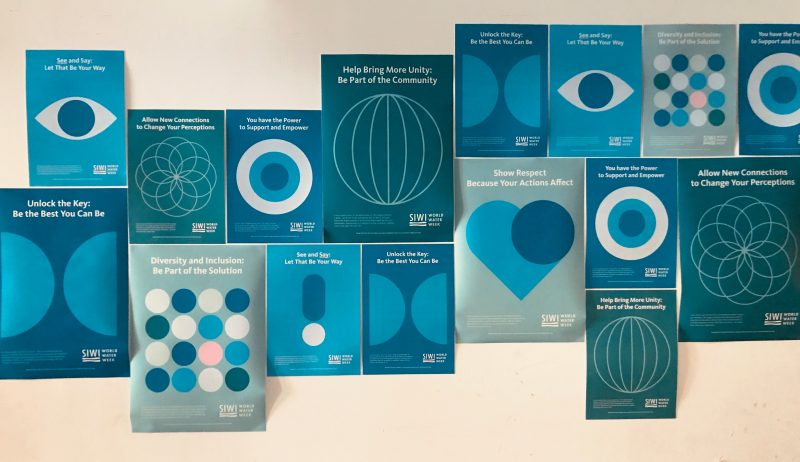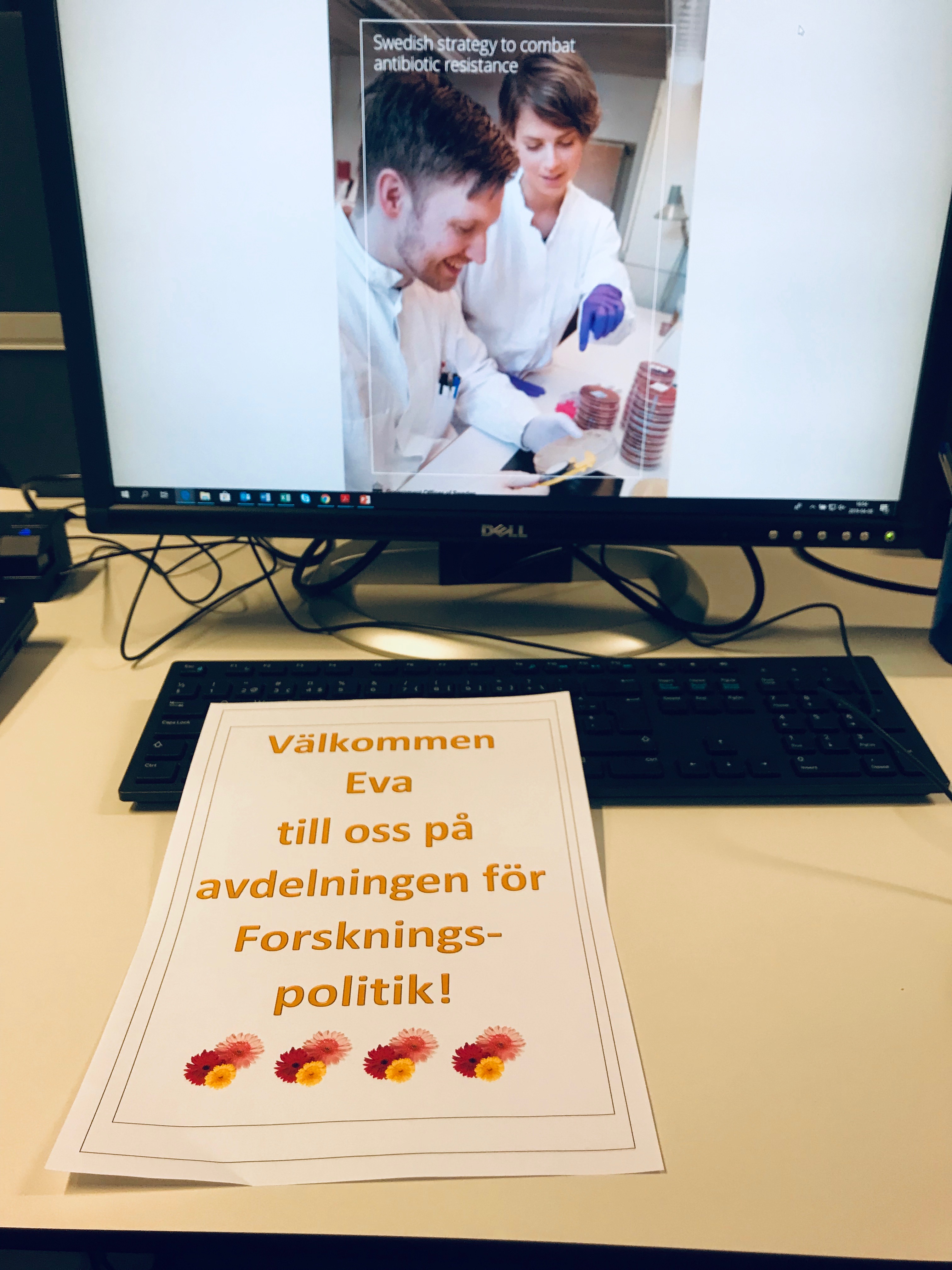
3-month Internship at Vetenskapsrådet/Swedish Research Council (VR): a postdoc experience
The internship at VR provided me with an invaluable insight into the Swedish working culture at a public organization. It also improved my Swedish language skills; I got the chance to meet new co-workers, learn about the research infrastructure of Sweden as a whole, and discuss topics that are important for the development of the country which I am residing in.

Welcome message from first day at work! 
World Water Week Conference
A little over a decade ago I embarked on my first summer-internship. My 19-yr old self back then was still a naïve fresh-faced university student ambitious to learn about anti-doping in sport and see what a research career was all about. Now, the choice is whether a career outside academia could be of interest.
This is a question that has been asked by many postdocs. Which leads us to tackle the next question pretty early-on: do I have any skills that could translate to an industry job if I choose not to continue within academia? In fact we do, and I am not just talking about the use of Microsoft office which is an essential check-box in the general skills section of any resume. Most of us [postdocs], are trained to learn on our own, be critical thinkers, creative problem-solvers, some are great bioinformaticians, programmers, writers, science policy enthusiasts and communicators. However, we have generally never applied our self-made toolkit to the ‘real-world’. A great starting point of course is to check-out the KI Postdoc Association (KIPA) homepage and join one of the annual outside academia events or professional development events that are hosted by KIPA1. This association was the starting point for me, first as an active member and then as the Vice-chair (2018). The time within the association helped shape a different mindset. Going from what purely benefits me to what would benefit the postdocs at KI? How do I effectively represent and communicate information to the leadership? How do we change the current infrastructure for the better? These questions helped me to get passionate about science policy; which can involve anything from working and training conditions, to the research funding landscape within Sweden. This mindset played a critical role during my internship and allowed me to tackle challenges from a different perspective.
Vetenskapsrådet/Swedish Research Council (VR)
VR is Sweden’s largest governmental research funding body- providing monetary support (approx. 7 billion SEK/year) across all scientific disciplines. VR is also responsible to advice the Swedish government on research policy matters1. During my placement, I was assigned to the policy advice unit assisting directly in the formulation of their 10-yr national research program for antibiotic resistance3. This is a coordinated agenda that should aid Sweden to fulfill its strategy to combat an identified global challenge-antimicrobial resistance(AMR). Optimizing research funding within the country and promoting inter- agency cooperation we can hopefully, create better surveillance systems, optimize the use of antibiotics, create new ones (incl. vaccines) and ensure a ‘One Health’ approach4.
After I became acquainted with the new research policy vernacular as well as all the national partners that are involved in the programme the real work kicked in, and I only have two words for you: excel files. Yes. Many excel files! One of my main tasks was to map what the current research and innovation landscape within AMR looks like in Sweden. This involved analyzing large-scale data such as filed patent documents describing technology that is/or could be beneficial in the area of AMR, postdoc and research project funding, publication output as well as the funders that are more or less active in this field. Skills required here is an interest to analyze different types of data, as well as to find interesting ways to communicate said data to experts and non-experts in Swedish and English.For me, given my background in metabolomics which tends to produce ‘large-volumes’ of data, I felt quite comfortable and really enjoyed the challenge to apply my experience to information that will be directly disseminated to the Swedish public. Also, by actively communicating and asking questions to my colleagues I learned new ways to analyze and visualize data that I can apply to my research work at KI.
World Water Week
Did you know that one of the most serious threats to our freshwater and marine ecosystems, as well as to our health, is the spread of antibiotics and antibiotic resistant bacteria in the environment?
Well, one of my side-projects was the co-organization of a joint showcase4 at the World Water Week conference. We [VR and Formas] gathered experts from academia, industry and the European Commission in order to tackle this exact global challenge from three different perspectives. Skills involved included event planning experience, communication, and the creation of promotional material. It was interesting to learn the process of event management and advertisement at a public organization in addition to the benefits of inter-agency collaboration.
Inclusivity, professionalism and working culture.
I felt very much included at VR and my colleagues were for the most part very professional. There was a general drive from the management to promote people to work together and interact on projects in order to exchange expertise. I was invited to fikas, a colleague’s 50th birthday, as well as many lunches. “Ska vi gå och käka?”, this was a common phrase echoed across the open-plan office space, usually starting from 11:30am. Followed by the lunch train, or in Swedish “lunch tåg”. On one occasion, my division chief, whilst at lunch outside the office with other co-workers, made sure that even the way we were seated around the table ensured that no one was excluded. I was very impressed by this. Around 14:30/15:00 we would usually receive a fika email invitation for those that had 10 to 15 min to go for a coffee break. Work normally finished between 16:00 and 17:00.
My take-home message
“The ultimate value of life depends upon awareness and the power of contemplation rather than upon mere survival” (Aristotle)
There are positive and negatives everywhere. I would absolutely recommend an internship to another postdoc, and especially at VR if you are interested in science policy work. The professional development gained by this experience is invaluable- and as with any life experience one is left with many things to contemplate before moving forward.
Some tips:
- Create a diary (in word or online) to document achievements of the day. Did you know that employees of public authorities need to clearly document the amount of time they work, when they leave as well as what they are doing with their time at work? Creating the diary becomes a very good exercise.
- Go to the fika breaks. When you are looking into a computer screen all day your eyes will get very tired and it is absolutely not ok to sit all day. This much we know! Hence, in order to rest your eyes and have a short coffee break go to the fika. They usually last anything from 10-30 min.
- Speak as much Swedish as possible. This is a no brainer! Hence, follow point 2 and 4.
- Create professional relationships with people around the office. This is a great way to find out what others are doing, get a more holistic view of what the company/organization is all about whilst building a stronger network. I was strongly encouraged to do this by my division head.
- Be professional. It seems odd to add this as a tip but not all work environments are the same. Remember to greet people and take an interest in them. It goes a long way.
- To check out Swedish funded research projects go to sweCRIS and for academic publications SwePub. For life sciences companies in Sweden try swedenBIO.
Acknowledgements
I would like to thank my VR colleagues for making the atmosphere so great for me- needless to say that I am left with many positive and funny memories. My VR supervisor Patriq Fagerstedt for providing me with the opportunity to join the team, for listening to my lunch-time monologues and providing me with some great advice and support, in addition to teaching me more about the Swedish system. I would also like to thank my division chief for being a positive example. I would also like to thank Petra Wallberg and Kristina Laurell from Formas for making the planning of the conference so much fun. Thank you to the Careers Service (KI) for creating this opportunity for us postdocs. Finally, my biggest thank you goes to my boss, Craig Wheelock, for recognizing the importance of such an internship and letting me pursue this opportunity.
References
1 KIPA (link)
2Reports from analyses conducted by VR (link)
3Outline of the National Research Programme (link)
4Swedish Strategy to Combat Antibiotic Resistance (link)
5Showcase link on conference website available here
All images shown in this blog post have been taken by me (copyright belongs to Evangelia Daskalakis)

1 comments